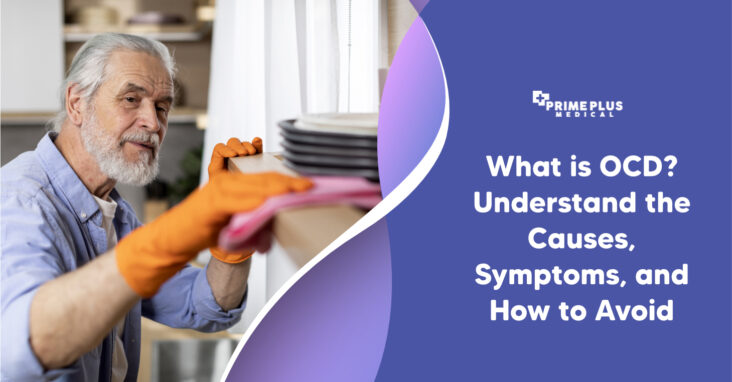Obsessive-compulsive disorder (OCD) is a mental illness that causes sufferers to constantly repeat particular behaviors. This activity is intended to control the patient’s anxiety.
Obsessive-compulsive disorder can affect people of any age, however, it is most common between the ages of 7 and 17. People suffering from OCD are frequently aware that their thoughts and actions are excessive, yet they are incapable of controlling it.
OCD frequently centers on certain themes, such as an obsessive fear of being contaminated by germs. To relieve your contamination anxieties, you may wash your hands obsessively until they are sore and chapped.
If you have OCD, you may feel humiliated and embarrassed about it, but treatment is possible.
Symptoms
The risk of OCD is considered to be influenced by a number of factors, such as genetics, change in brain chemistry, and environmental factors.
OCD is characterized by anxiety-inducing mental disorders and repetitive activities performed to relieve this distress. For example, those with OCD who fear sickness are more prone to wash their hands excessively or clean the house too regularly.
Examples of obsession signs and symptoms include:
- Fear of being contaminated by touching objects others have touched
- Doubts that you’ve locked the door or turned off the stove
- Intense stress when objects aren’t orderly or facing a certain way
- Images of driving your car into a crowd of people
- Thoughts about shouting obscenities or acting inappropriately in public
- Unpleasant sexual images
- Avoidance of situations that can trigger obsessions, such as shaking hands
You may be keen to read about The Health Risk of a Sedentary Lifestyle and Ways to Fix It
How to avoid Obsessive-Compulsive Disorder (OCD)
There are some effective treatments for OCD that can help reduce the impact it has on your life.
The main treatments are:
- psychological therapy – usually cognitive behavioral therapy (CBT), which helps you face your fears and obsessive thoughts without “putting them right” through compulsions
- medicine – usually a type of antidepressant medication called selective serotonin reuptake inhibitors (SSRIs), which can help by altering the balance of chemicals in your brain
There are 2 main ways to get help:
- refer yourself directly to a psychological therapies service – find a psychological therapies service in your area
- see a GP – they’ll ask about your symptoms and can refer you to a local psychological therapies service if necessary
You can ask for treatment through a specialized service, rehabilitation service, or an institution that focuses on the exact symptoms you are experiencing.
These services can assist you in managing your symptoms and recovering. PrimePlus Medical is here to help you.
PrimePlus Medical is your trusted healthcare provider in Canggu, Bali. Our team of English-speaking doctors is always ready to offer you international quality medical services. From quality consultation to great emergency care and even vaccination services, we are passionately driven to become your top healthcare solution in Bali.
If you are interested in our services, please do not hesitate to give us a call at +(62)361 474 0055 or email us at [email protected]

